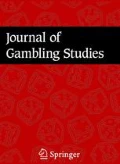Abstract
Pathological gambling is defined as inappropriate, persistent, and maladaptive gambling behaviour. It is a non-pharmacological addiction classified as an impulse control disorder. However, pathological gambling has been associated with dopamine agonist use. Here we report of a 28-year-old man with a first major depressive episode and a post-traumatic stress disorder who has been treated with a combination of the serotonine/noradrenaline reuptake inhibitor duloxetine and the tricyclic antidepressant maprotiline. The administration of antipsychotic flupentixole (up to 7 mg) turned this slight online poker gambler into an excessive gambler. Only after the discontinuation of the antidopaminergic agents and the switch to bupropion did this gambling behaviour stop which suggests a causal relationship between dopamine antagonists and pathological gambling.
Similar content being viewed by others
References
Lim, S., Ha, J., Choi, S. W., Kang, S. G., & Shin, Y. C. (2012). Association study on pathological gambling and polymorphisms of dopamine d1, d2, d3, and d4 receptor genes in a Korean population. Journal of Gambling Studies, 28, 481–491.
Miura, J., Kikuchi, A., Fujii, A., Tateishi, T., & Kaneko, S. (2009). Pathological gambling associated with cabergoline in a case of recurrent depression. Drug Discoveries & Therapeutics, 3(4), 190–192.
Nader, M. A., & Czoty, P. W. (2005). PET imaging of dopamine D2 receptors in monkey models of cocaine abuse: genetic predisposition versus environmental modulation. American Journal of Psychiatry, 162, 1473–1482.
Seedat, S., Kesler, S., Niehaus, D. J., & Stein, D. J. (2000). Pathological gambling behaviour: emergence secondary to treatment of Parkinson’s disease with dopaminergic agents. Depression and Anxiety, 11(4), 185–186.
Smith, N., Kitchenham, N., & Bowden-Jones, H. (2011). Pathological gambling and the treatment of psychosis with aripiprazole: Case reports. British Journal of Psychiatry, 199, 158–159.
Volkow, N. D., Chang, L., Wang, G. J., Fowler, J. S., Ding, Y. S., Sedler, M., et al. (2001). Low level of brain dopamine D2 receptors in methamphetamine abusers: Association with metabolism in the orbitofrontal cortex. American Journal of Psychiatry, 158, 2015–2021.
Zack, M., & Poulos, C. X. (2007). A D2 antagonist enhances the rewarding and priming effects of a gambling episode in pathological gamblers. Neuropsychopharmacology, 32, 1678–1686.
Zack, M., & Poulos, C. X. (2009). Effects of the atypical stimulant modafinil on a brief gambling episode in pathological gamblers with high vs. low impulsivity. Journal of Psychopharmacology, 23, 660–671.
Conflict of interest
None.
Author information
Authors and Affiliations
Corresponding author
Rights and permissions
About this article
Cite this article
Grötsch, P., Lange, C., Wiesbeck, G.A. et al. Pathological Gambling Induced by Dopamine Antagonists: A Case Report. J Gambl Stud 31, 295–297 (2015). https://doi.org/10.1007/s10899-013-9433-2
Published:
Issue Date:
DOI: https://doi.org/10.1007/s10899-013-9433-2



